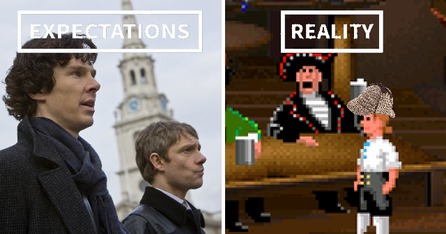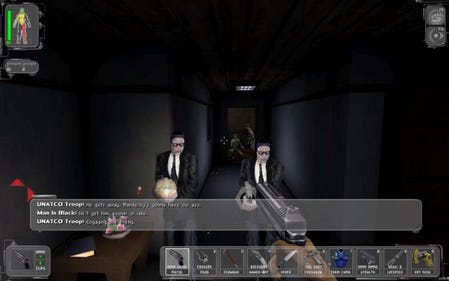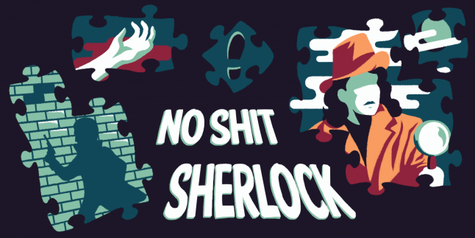
Featured Blog | This community-written post highlights the best of what the game industry has to offer. Read more like it on the Game Developer Blogs or learn how to Submit Your Own Blog Post
We are terrible detectives
Detective games are broken. Most feel like classic point and click games with a different dressing. How do we improve them? Well, here's a couple of thoughts, questions and an idea that might fix a whole genre.

Let's face it, we're terrible detectives.
Most games out there about being a detective only get the dressing right, we're solving the same puzzles we always do but instead of being a pirate we're told we're something else.

I'm sure I'm not the only one who has always been a huge fan of Sherlock Holmes, bought one of the games based on his stories and then got immediately disappointed when gameplay never felt anywhere close to what I expected. Only a few games got close to nailing the experience.
It's not that these games don't have high production values or excellent professionals making them, it's just that capturing the experience is too hard.
Mark Brown already discussed some of the challenges of making a good detective game. Perhaps the biggest hurdle we must overcome is the lack of player freedom. In most games it's ok to put a gun in the player's hands and tell them to shoot stuff, that's pretty much all you need to feel the adrenaline and be an action hero.
But detectives are something else, they're the smart people in the room, the ones who see the connections everybody else missed, the ones who think out of the box. And that's terribly hard to achieve in games. We like to live inside our comfy boxes defined by our design rules. We do have some games (mostly immersive sims) that push players to think out of the box, but they are still usually restricted to "kill that enemy" or "try to avoid that other enemy".

There are three points we should keep in mind while trying to make players feel like a detective:
Searching for the needle in a haystack: When looking for the answer to a question we should feel like we're trying to find a needle in a haystack. There's hundreds of possible solutions, but only one is right. Our wits and the clues we find will tell us in which part to look. Some games provide a great amount of content just to mislead players, others have come up with quite original solutions, like "Her Story", where we have to use a search bar to browse videos. We could type anything we want, but we need to figure out the right words; that's a great example of how to give players more freedom.
Careful with what you say: Everything in the game, from the main character thoughts to interfaces and buttons, might be giving away information and limiting player's freedom. Let's say that you have a window where you must select who you think the killer is. Can you select more than one suspect? Then you're taking away a very interesting possibility, that the crime was done by more people. Can you select a stranger as the murderer? Perhaps you're sure somebody else did it but it's not one of the people you've met. Can you select the person who died? Perhaps it was a suicide. See what I mean? Every single detail in your game could be narrowing the possibilities and guiding the player. Some questions may sound stupid, but you need to let players go through every possibility themselves and decide whether or not is worth considering it.
Maybe avoid some design conventions: If being a detective is about thinking outside the box and "breaking the rules", maybe we should take a second look at the rules of our own games. Even the greatest detectives got things wrong or let somebody get away at some point. Why aren't we allowing players to fail? Usually it's either complete the puzzle or get stuck forever. Some games will even point out you were wrong and let you choose another option before moving on. Why can't we make a mistake and have the police arrest the wrong person? Or follow clues that lead to dead ends? It should all be about giving players yet more freedom, even if that means they might fail.
But enough about challenges, let's talk about some neat tools on our belts that we might not be using:
Surrealism: Maybe giving enough freedom in a realistic environment is beyond our reach. Perhaps it'd be easier to start somewhere else. If making good dialogues is too hard why don't we set the game in a world filled with robots that can't talk? But we can access their reports if we provide a date and an hour. If letting players come up with deductions is too complex why don't create an environment where everybody has less freedom and, therefore, less things they could have done? Imagine solving a murder that took place on a chess board where all the pieces (the murderer included) have to follow chess' rules.
Procedural mumbo jumbo: Yeah, procedural generation can be used for something else than making pretty maps. We need a lot of hay to hide our needle, maybe we can use procedural hay. What if we generate a procedural population? Give them links between people, reasons they hate/like each other. That would give players more freedom and allow them to chase false clues down, making them think more carefully.
A more mechanic-based approach: Most detective games are narrative-heavy, it's easy to see why. The issue with traditional narrative games is that they limit payer freedom as every possible assumption must be implemented by one of the writers. There's no way that doesn't feel like a closed environment where one can hardly move. In detective tales solving a crime feels like a game, so maybe we should try a more gamy approach. What if clues and statements were cards? Conversations would be like a card game where you try to counter your opponent's plays with your own cards. A pure and traditional approach isn't really getting us where we want, so why not try something else?

I wouldn't want this whole discussion to end with this article. I'm sure we all have some ideas that we'd love to try, most might fail but we'll end up with some wonderful concepts.
That's the reason I'm using the chance to announce "No Shit Sherlock Jam", a game jam where we'll try to fix detective games. It'll start on March 9th and participants will have over a week to develop prototypes. There will also be sub-themes (like Global Game Jams diversifiers) announced a couple of days before to get your minds working.
So I invite you all to join the jam, spread the word and have fun while we try to crack a hard design challenge, how do we make players feel like true detectives? (I'm fully aware of the pun)
Read more about:
Featured BlogsAbout the Author
You May Also Like









